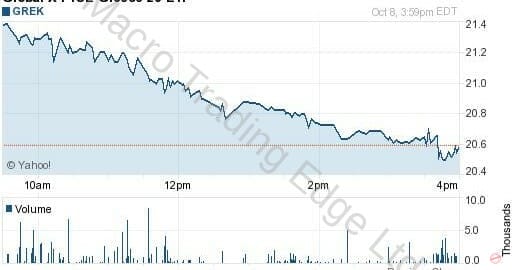Global Macro Alerts™ – GREK: why the price divergence with Greek banks?
Positive news on the Greek investment climate has come in on several fronts – investment, political and economic.
Most of the articles in the news today were positive. However the price of GREK has dropped by over 3% today. In contrast, the two Greek banks (Alpha and Piraeus) were both up about 6% on trading in Athens today.
I will discuss the political and economic aspects briefly before looking at the investment news and providing an analysis of the price divergence today between Alpha/Piraeus Banks versus GREK, the Greek ETF.
Political/Economic Assessment
The far-right party Golden Dawn party lost 30% of its support right after the fatal stabbing of the anti-racism rapper. According to Reuters, the recent poll by Rass taken right after the stabbing (19th to 21st of September) shows that support has fallen to 5.8 %, or a 2.5% drop from 8.3% right before the stabbing.
As discussed in my previous article, this will lead to a more stable and normal political climate in Greece. It is expected that parties in the center will gain some momentum. Both centrist parties (New Democracy and PASOK) are committed to staying with the austerity program.
PASOK was the 4th most popular party with 7% of the votes. Recent developments should now make it the 3rd most popular party. Since they are in a coalition with the ruling New Democracy party, the center is strengthened.
Please note that without sustained improvement in the economic sphere, this recent political development is fragile and support for the far-right or other extreme parties could materialize again.
Regarding economic news on Greece today it was positive. However, the WSJ publication of IMF views on the program clearly showed a lack of confidence that it would work and most noted a need for debt restructuring. This was discussed further in the WSJ article. In an FT article, Yiannis Stounaras, the Greek finance minister, provided an upbeat assessment for next year.
Investment Assessment
A recent FT article discussed how several major hedge funds (Paulson &Co., Baupost, Eaglevale, Dromeus Capital Falcon Edge, York Capital and Och-Ziff) along with long-only players (Wellington Capital Group and Fidelity) have invested big on Greek banks.
Alpha and Piraeus are two banks mentioned specifically since Paulson & Co. have bought substantial stakes. These two banks are seen as the most attractive after being recapitalized earlier this year. The shares in both banks are up 8% this year, but warrants are up 80% for Piraeus and 100% for Alpha. The warrants can be swapped for shares at predetermined levels once ownership is transferred to the private sector.
A word of caution is needed here. The hedge funds are probably buying warrants which are similar to a call option but issued and guaranteed by the bank itself. A call option on the other hand is issued on an exchange. The warrants are issued to entice investors to purchase bonds. Thus, my guess is that the hedge funds mentioned in the FT article are mostly investing in Greek bank bonds and obtaining the warrants as an extra inducement.
Normally, exercising warrants would result in earnings dilution. Further analysis needs to be done in this case as each warrant would represent about 7.5 shares currently held by the HFSF (Hellenic Financial Stability Fund).
Alpha Bank warrants give the right to exchange 1 warrant for 7.40867 shares currently owned by HFSF (Hellenic Financial Stability Fund). The majority of the warrants (over 73%) are owned by 418 shareholders with remaining 27% are owned by 77,544 investors. Thus, it is very clear that large investors (hedge funds, etc.) control the majority of warrants. At the moment, HFSF owns 83.66% of Alpha Bank. Piraeus Bank and National Bank of Greece are similarly owned by HFSF.
Why the price divergence?
Alpha shares increased by 6.5%, while Piraeus Bank was up by 5.84% today. In contrast, the National Bank of Greece ADR (NBG) is down by 6% as of noon trading on the New York Stock Exchange.
Interestingly, the Greek ETF, GREK declined by 4.72% as the close of trading on the New York Stock Exchange.
Regarding Alpha Bank, the price received a big boost today from very positive news that large hedge funds, led by Paulson & Co. have bought Greek banks. As noted above, this is not as clear cut as it first seems. They have bought the banks to get their hands on the attractive warrants, which have already increased 80 to 100% as discussed above. With the positive news and price movement today, the hedge funds may be selling their warrants and equity holdings in the Greek banks to other investors. You should keep in mind that hedge funds buying Greek banks is old news. In short, they are getting out or reducing their stake.
The drop in the price of GREK is more long-term in my opinion. This is a reaction to the IMF report, mentioned above, regarding disagreement on the viability of the package. Thus, political risk is introduced back into the equation since Europe and Germany, in particular, will be faced debt reduction in the future.
Below are the charts of Alpha Bank and GREK today.

Source: Yahoo Finance

Source: Yahoo Finance
My advice, be cautious on the Greek banks as I think this is a short-term bubble. A price reversal is highly probable. Regarding GREK, investors have just been reminded that debt restructuring is still on the table. European politics, especially German politics will play an important role on this issue. The Europeans have offered to reduce the interest rate and extend the term of the loans. This may not be enough, setting up another period of political wrangling which will result in increased market volatility.
ETF: GREK
NOTE: this article or a modified version has also been published on Seeking Alpha and on Yahoo Finance (ETF symbols: GREK).
[/vc_row]
